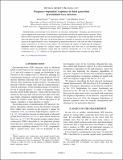Frequency-dependent responses in third generation gravitational-wave detectors
Author(s)
Essick, Reed Clasey; Vitale, Salvatore; Evans, Matthew J
DownloadPhysRevD.96.084004.pdf (4.651Mb)
PUBLISHER_POLICY
Publisher Policy
Article is made available in accordance with the publisher's policy and may be subject to US copyright law. Please refer to the publisher's site for terms of use.
Terms of use
Metadata
Show full item recordAbstract
Interferometric gravitational-wave detectors are dynamic instruments. Changing gravitational-wave strains influence the trajectories of null geodesics and therefore modify the interferometric response. These effects will be important when the associated frequencies are comparable to the round-trip light travel time down the detector arms. The arms of advanced detectors currently in operation are short enough that the strain can be approximated as static, but planned 3rd generation detectors, with arms an order of magnitude longer, will need to account for these effects. We investigate the impact of neglecting the frequency-dependent detector response for compact binary coalescences and show that it can introduce large systematic biases in localization, larger than the statistical uncertainty for 1.4-1.4 M[subscript ⊙] neutron star coalescences at z ≲ 1.7. Analysis of 3rd generation detectors therefore must account for these effects.
Date issued
2017-10Department
Massachusetts Institute of Technology. Department of Physics; LIGO (Observatory : Massachusetts Institute of Technology); MIT Kavli Institute for Astrophysics and Space ResearchJournal
Physical Review D
Publisher
American Physical Society
Citation
Essick, Reed et al. "Frequency-dependent responses in third generation gravitational-wave detectors." Physical Review D 96, 8 (October 2017): 084004 © 2017 American Physical Society
Version: Final published version
ISSN
2470-0010
2470-0029